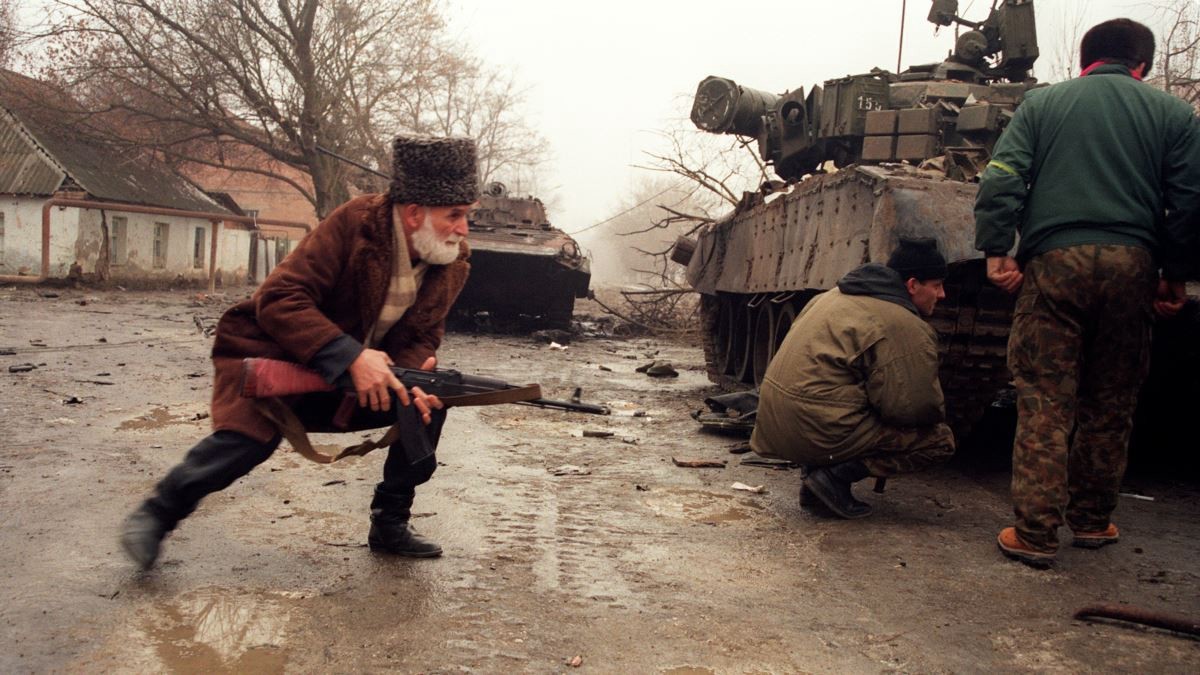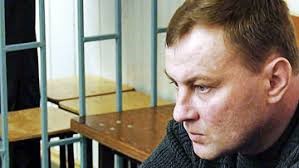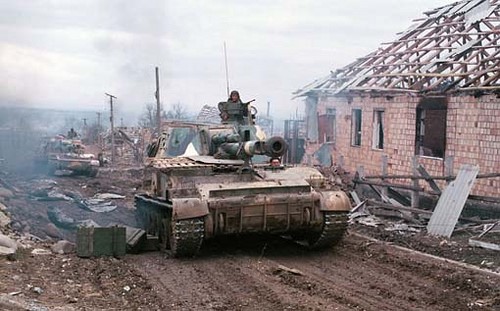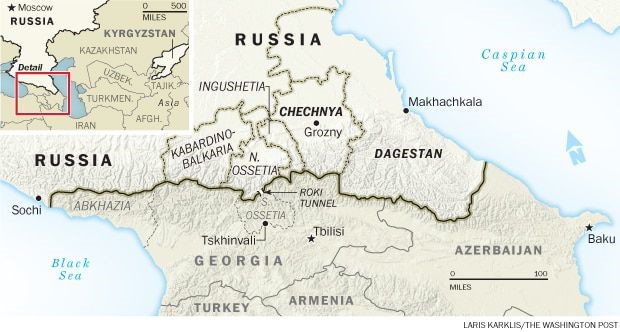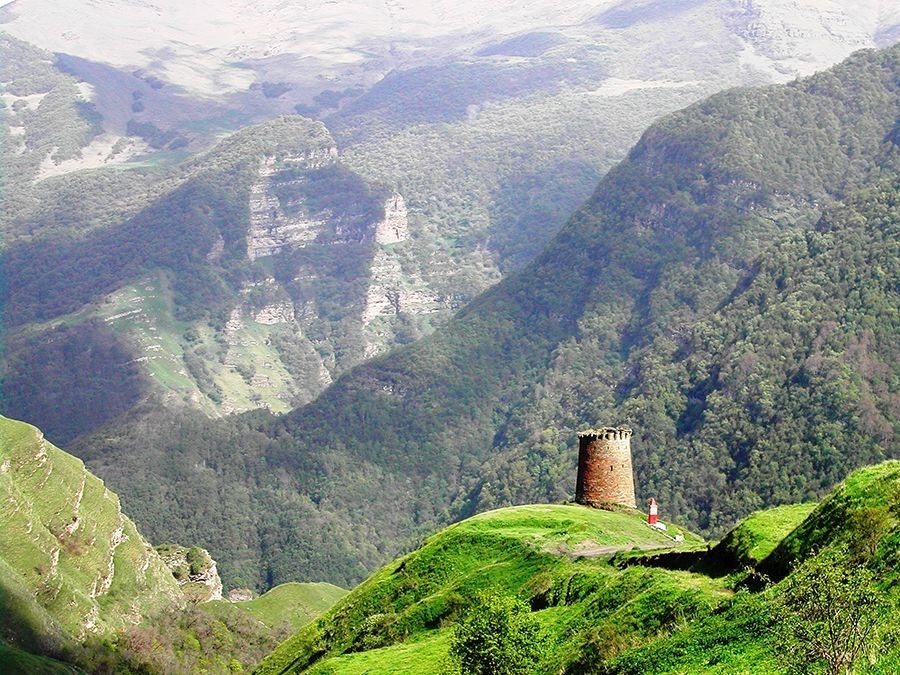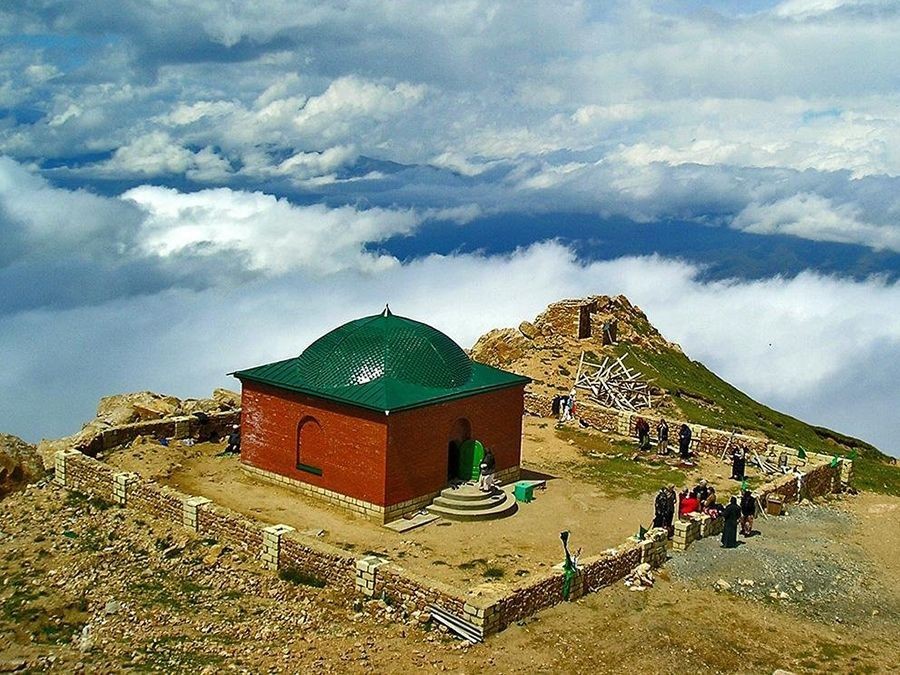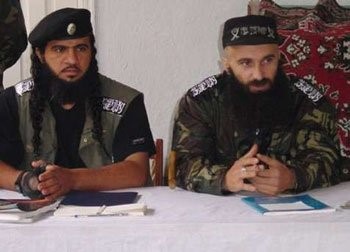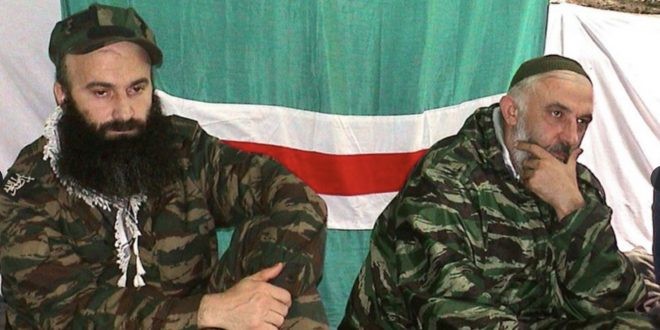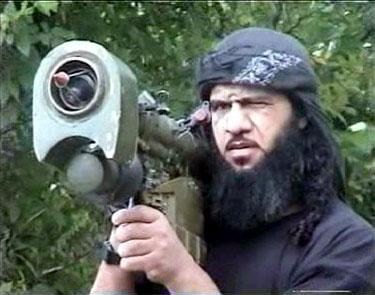Andrew McGregor
Canadian Institute of International Affairs
Summer 2000
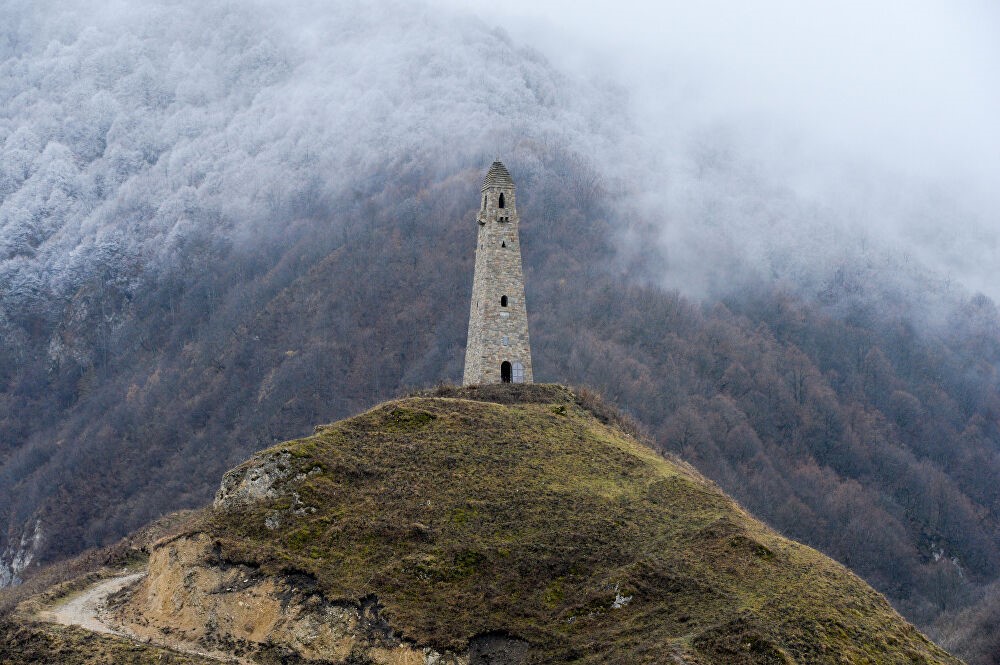 Vainakh Tower, Chechnya (Sputnik News)
Vainakh Tower, Chechnya (Sputnik News)
In recent months, the warfare in Chechnya has entered into a bitter “no quarter” struggle, prompted in large part by what Chechens see as an unrelenting attack by Russian security forces on the dignity and well being of the civilian population. Rape, torture, murder and hostage-taking are all alleged by the Chechen resistance, who have brought their own Islamic perspective to the problems of what they see as Russian war-crimes. [1] There is, however, no single Chechen viewpoint. It is important to recognize that the Chechen resistance is not hierarchical in structure; it is a network of government forces, clans, bands of warlords and foreign volunteers from North Africa, Bosnia, Turkey, the Middle East and Central Asia, bound only by a common hatred of the Russians. For these fighters, the enemy is waging a genocidal crusade organized by Orthodox Christians and a criminal Kremlin regime, aided materially and financially by the “hypocritical Western states” and the Zionists of Israel. The rhetoric of the president of Russia, Vladimir Putin, is couched in the language of a crusade, as he urges Christians and Jews to united against an international effort to restore the Islamic Caliphate.
The Russian forces are no less heterogenous; the current war is being fought largely by a bewildering array of special forces units rather than the line regiments of the Russian Army. The spetznaz units include marines, paratroopers (desantniki), SOBR (rapid reaction forces) and kontraktniki, as well as various para-military units, most notably the OMON forces who report to the Interior Ministry. There are, in addition, units of the GRU (Defence Ministry intelligence) and the FSB (heirs to the old KGB). The mujahidin response to this alphabet-soup of opponents is that the Russians `do not recognise that the Mujahideen do not care about the cool names and fancy titles of Russian forces – whatever units the enemy deploys in the field will eventually be annihilated by the soldiers of Allah.’ Allied to this array of forces is Bislan Gantamirov’s largely ineffective pro-Moscow militia. For its part, the Russian government claims to be engaged in a battle against `terrorists’ and `bandits,’ common criminals who fall outside the protection offered to legitimate combatants under international rules of war.
Imam Akhmed Kadyrov, Putin’s choice as the new governor of Chechnya, opposed the Russians in the 1994-6 war. He represents the dominant mystical Sufi approach to Islam that has come under increasing pressure in Chechnya from more ascetic Islamic movements, such as Wahhabism. Kadyrov’s reconciliation with the Russians is largely a reaction to the growth of conservative Islam, which has been adopted by many of the most militant field-commanders and their fighters. Though the Kremlin is interested in foisting responsibility for security onto Kadyrov’s shoulders, the religious leader has no real armed force of his own and has to rely entirely on his former Russian enemies. Several of his aides have been assassinated, and the Chechen president, Asian Maskhadov, has publicly called for his death, as have a number of prominent warlords who accuse him of promoting “Russian atheism.”
Police and Martyrs
Certain elements of the Russian security forces have so antagonized the Chechen field commanders with their brutal approach to the civilian population that they have been especially targeted for reprisal attacks by the mujahidin. Among these are the kontraktniki, comparatively well-paid volunteers who are generally older and more hardened than the youthful conscripts of the Russian army and can thus be counted on to do the dirty work of re-occupation. They have generally been shown little or no quarter at the hands of the mujahidin and have been much reduced in numbers through casualties, desertion, or failure to re-enlist at the end of their contracts. The OMON para-military has also been singled out for special treatment by the mujahidin. Unlike units of the Russian armed forces, which may be drawn as a group from individual urban centres. Thus, the Russian command is forced to admit the scope of their losses when mass hometown funerals inevitably attract international media attention. OMON police un its are often unwitting victims of Russian propaganda. They are deployed into areas that have been optimistically declared free of mujahidin operations by the defence ministry, though in reality there is no such place south of the Terek River. With lighter weapons than the regular army (though no less so than the mujahidin) and little training for full-scale combat operations, the columns of OMON armoured personnel carriers are easy prey for mujahidin ambushes. OMON effectiveness is also limited by poor communications and often outright antagonism between the interior ministry and defence ministry forces in the field.
A wave of suicide bombings (or “martyrdom operations” as the Chechens call them) was launched in the spring of 2000 against Russian military units accused of participating in war crimes. The first attack was carried out by Hawaa Barayev, a 19-year-old woman who smashed an explosives-laden car into the barracks of the Russian Special Forces in Alkhan Kala, detonating a massive explosion that badly shook the confidence of the Russians.
The mujahidin made full use of Hawaa Barayev’s action in statements following the attack: “Her sacrifice was a clear message to the enemy: get out or die.” The Chechens claimed that another suicide bombing in Grozny less than a week later was the work of a captured Russian who had converted to Islam and wanted to strike the Russians “for the sake of Allah.” [2] These bombings and other acts of martyrdom were also intended as a message for those in the ummah (the larger Muslim community) “who waste their time with worldly exploits while Muslims are slaughtered in Chechnya and other parts of the world.” Though the Chechen leadership has largely written off the Western nations for being in league with Putin, they remain bitter about the lack of support not just from the Muslim territories of the Caucasus, but also from the larger international Islamic community.
Although the official response of the Chechen government to the suicide bombings has been cooler than the ringing endorsements of the mujahidin warlords, it blames the same factors: “The recent chain of Chechen suicide attacks is a direct response to the Russian inhumane torture, rape and murder of the innocent Chechen civilians including women and children. The Government of the Chechen Republic of Ichkeria cannot control every Chechen that seeks vengeance for his tortured, murdered and raped relatives. In the whole history of mankind, no one has managed to prevent suicides from committing acts of self-destruction. Because of the Russian brutality and international indifference, such acts are becoming an irreversible process in Chechnya.” [3]
Arbi Barayev, a militantly Islamic field commander and leading “Wahhabite,” has risen to prominence in the current war. Still in his twenties, Barayev is nonetheless a veteran of the 1f994-96 war. He is also the uncle of Hawaa Barayev. Barayev ran the region of Urus-Martan after the first war as a personal fiefdom through the deployment of his “Islamic Battalion,” but he ran afoul of the Chechen government’s Anti-Terrorism Centre when he became a prime suspect in a wave of kidnappings. [4] Several firefights ensued between government forces and Barayev’s men, but Barayev was able to escape prosecution because Maskhadov was reluctant to start an all-out civil war. Although Barayev has proven his effectiveness as a commander in the Chechen resistance, he continues to be surrounded by controversy, in part because of his ruthless methods. Reports (possibly Russian in origin) have circulated that his forces failed to secure the lines of retreat for non-Wahhabite Chechen fighters evacuated from Grozny. [5]
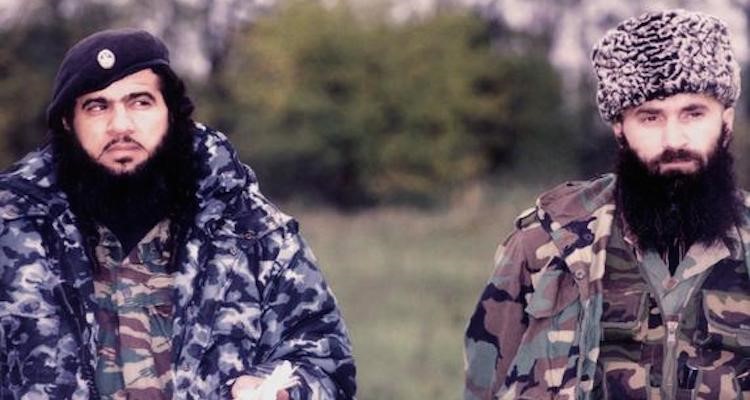 Amir al-Khattab and Shamyl Basayev
Amir al-Khattab and Shamyl Basayev
On 29 June, Shamyl Basayev, the chief of the Mujahidin Command Council, and Ibn al-Khattab, a Saudi-born warlord, delivered a warning to the Russians that war would spill over into Russian territory unless all Chechen women and children held against their will were released within three days: “We see the repeated violations committed by the Russian military against innocent women and children; we hear the cries of the women who were violated and women who were widowed; we hear the cries of the elderly and the young, and see the concentration camps crowded with the innocent. Our patience has run out in view of these crimes unless a clear deterrent stands in their way.” [6] True to their word, the mujahidin struck on 2 July with five suicide bombings and intensified ambushes and attacks throughout the republic. Incredibly, the Russian security services appear to have taken no precautions against the attacks, even though they were given three days’ warning. The Russians reported scores of casualties, while the mujahidin claimed up to 1500 Russian dead in one day’s actions; it is nearly impossible to ascertain the true numbers because Russian security forces immediately made all the sites off limits to observers. It does appear, however, that incoming casualties strained Russian medical facilities to the limit.
While the Chechen commanders have not hesitated to claim responsibility for the suicide attacks within Chechnya, they have adamantly denied any involvement in the 1999 bombings of apartment buildings and the summer 2000 subway bombing in Moscow. After all, as they point out, there is an abundance of military targets within Chechnya. There is strong evidence that the apartment blasts at least were the work of the Russian FSB. The Chechen vice-president, Vakha Arsanov, claims that the subway bombing was also the work of Russian security forces, designed to revive dwindling Russian interest in continuing the war of attrition in Chechnya and to provide President Putin with greater centralized power. In many ways the war in Chechnya serves as an object lesson to those parts of the federation that followed Boris Yeltsin’s advice to “seize all the autonomy you can” after the dissolution of the USSR.
The Case of “Colonel-Sadist” Budanov
An incident earlier this year illustrates the bitter divide that has arisen between Western and Chechen perceptions of war crimes. In March, Colonel Yuri Budanov raped and murdered an 18-year-old Chechen before crushing her body beneath the tracks of his tank in full view of his regiment. Budanov was arrested and charged by Russian authorities on 29 March. But the mujahidin are suspicious of war crimes trials conducted by Russia, regardless of the outcome; such trials are seen merely as the sacrifice of a few individuals in exchange for a public excuse for Western governments to continue funding the Russian war machine. Thus, the mujahidin offered to exchange nine captured members of the Interior Ministry forces for Budanov, who would then stand trial before the Chechen shari’a court.
The nine OMON men, all from the Russian city of Perm, were captured by Emir Khattab while they were on a marauding mission near Zhanni-Vedeno. A mujahidin communiqué signed by Khattab and Basayev stated that the prisoners would face execution unless Budanov was handed over within 72 hours. According to the mujahidin, the brother of the slain woman was in their ranks and would perform the executions himself (as called for in the adat, the still influential pre-Islamic code of law in the north Caucasus). The Russians refused, and the nine OMON men were killed on 5 April. Their photos and identification cards were posted on the rebels’ internet site along with a promise that the execution of prisoners would continue until Budanov was turned over to the mujahidin.
On 9 July, bombs went off in the southern Russian towns of Vladi Kavkaz and Tostov, killing three civilians and injuring fifteen. Rostov is the home of Colonel Budanov, but again the mujahidin denied all allegations of involvement and claimed that the bombs were planted by the FSB to further inflame public opinion; “Let the Russian government and the whole world know that the Mujahidin do not disclaim any operations they conduct. The Mujahidin are proud of all operations they launch and acknowledge them without fear or hypocrisy. Had the Mujahidin conducted these blasts they would have admitted it; but such actions are against the morals of Islam which condemn the murder of the innocent and the weak. Rather the murder of the innocent is part of the behavior of the cowardly Russians. This war is between us… and the Russian military; it is not between us and the Russian people. If we wanted to conduct explosions, we would have done it against the Russian military in Chechnya and beyond Chechnya.” [7]
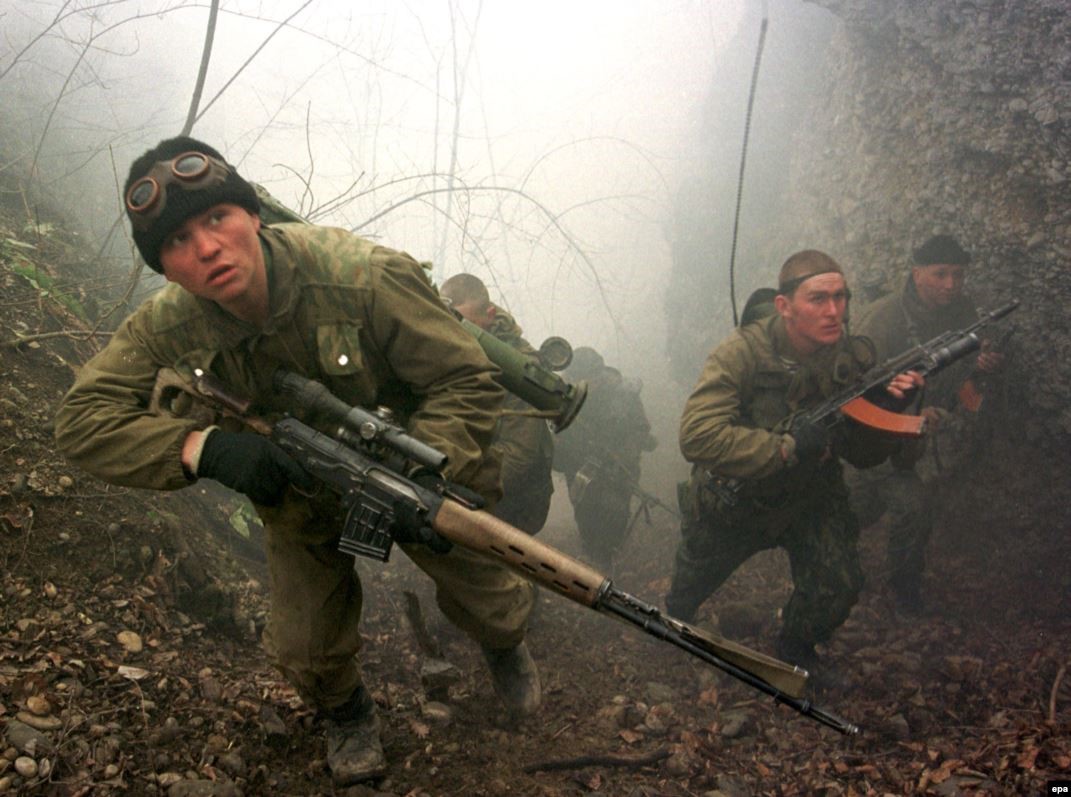 Russian Special Forces in Chechnya (Rferl.org)
Russian Special Forces in Chechnya (Rferl.org)
Other offers to exchange Russian captives for Budanov have failed and more prisoners have been executed. Many captives face summary execution; three Chechen employees of the FSB were killed on 24 July after they were seized by al-Khattab’s “Islamic Peacekeeping Army,” and in early August the mujahidin announced the execution of three captured GRU (military intelligence) agents.
The operations described above are typical of many carried out since March in which officers of the Interior Ministry, Russian intelligence services and “national traitors” (Chechens in the service of the Russian Federation or the puppet government of Akhmad Kadyrov) were executed after hearing the verdict of the Chechen shari’a courts (“Decision on neutralization of criminal activity in the territory of the Chechen Republic of Ichkeria,” February 2000).
On 13 March 2000, the Chechen state-committee of defense listed 56 accused Russian and Chechen war criminals, including Yeltsin, Putin and Kadyrov, with an appeal to the international community for help in apprehending them. In September, the mujahidin issued cash contracts on the lives of 20 major Russian politicians and generals. During the September United Nations millennium summit, the Chechens officially asked the United States to arrest and hand over President Putin on charges of mass murder and genocide, and the minister of the interior, Vladimir Rushailo, narrowly escaped death in an ambush in Chechnya.
International vs. Islamic Law
Russian protests against Chechen treatment of prisoners-of-war are somewhat compromised historically by the Soviet army’s refusal to grant prisoner-of-war status to German troops, who they saw as war criminals, in World War II. The Geneva Convention of 1929 does not recognize reciprocity as grounds for violations of its articles by any of its signatories. The most relevant precedents for the Chechen actions can be found in the post-war conflicts in Algeria and Vietnam, where the offending parties were not clearly bound by the Third Geneva Convention. The execution of French prisoners by the Algerian provisional government in 1958 and 1960 was justified as punishment for war crimes, but was more likely in reprisal for the numerous executions of captured Algerian fighters by the French military tribunals, which, like the Russians, refused to consider their captives prisoners-of-war. The reprisal executions occurred before the provisional government acceded to the Geneva Convention in 1960.
The mujahidin leadership has gone to great lengths to justify their selective execution of Russian prisoners as in accord with Islamic law and tradition. Basayev and Khattab, though not religious leaders or scholars, claim to have spent six months consulting Islamic texts and scholars “to ensure that our Jihad was within the guidelines of Sharia.” The question of the fate of non-Muslim prisoners-of-war has been addressed many times over the years, and a substantial body of work by Islamic scholars exists on this point. The Chechens have cited the opinion favored by three of the four Sunni schools of Islamic jurisprudence, which gives the leader of the Islamic forces and his deputies the option of choosing execution, ransom, confinement or release, whichever provides the greatest benefit to the Islamic community. This allows the mujahidin to reject criticism from within the Islamic world that the execution of the nine OMON men was a violation of the maxim that “No bearer of burdens can bear the burden of another” (Koran, 35:18): “We are not obliged to treat prisoners in any particular way; we study the character and circumstances surrounding each prisoner and make a decision that is based upon and thoroughly backed by Divine Law.” [8] It should also be noted that reprisal killings and suicide attacks are consistent with the adat of the northern Caucasus highlands, which calls for blood revenge for the death or humiliation or relatives in the extended clan and provides for a tradition of pledging one’s life in the pursuit of ghazawat, the local form of holy war.
Reprisal punishments hold some attraction for desperate and inferior military forces: “For a technologically weaker party the prisoners it has captured may be one of the few ‘assets’ it possesses vis-à-vis the adversary. The inclination to use this asset is likely to increase if its combatants are not recognized as lawful combatants by the adversary, but are prosecuted and possibly executed as criminals.” [9] Such actions are often counter-productive, as the probability of torture and death provides little incentive for Chechen fighters to surrender. As Chechen commander Akhmad Zakayev has pointed out, it is safer to take up arms against the Russians than to wait for arrest and then attempt to prove that you’re not a fighter. The Chechens are not, however, blameless when it comes to battlefield atrocities. The heavily out-numbered mujahidin rely to a large extent on their fearsome reputation to help even the odds and are rarely averse to demonstrations of their own ruthlessness (The spring communiqué of the mujahidin to the Russian forces consisted of the cheery message: “The ground is turning green once again, and the Mujahidin are ready to reap the fruits of spring. O you Russians! We see that your heads are ripe for decapitation – you have no escape!”). Constantly on the move, the guerrillas do not have the facilities or resources to take many prisoners in any case.
The Chechen approach to the issue of war crimes and international law reveals deep divisions between Aslan Maskhadov’s official Chechen government and the more militant of the mujahidin represented by Basayev and al-Khattab. The mujahidin respond to allegations of violations of international law by citing the following:
- The mujahidin are not members of the United Nations and have no wish to sign any of their accords or treaties.
- The mujahidin have never given any commitment not to kill Russian prisoners and cannot therefore be accused of violating any prior agreement.
- Several of the clauses of the Geneva Convention regarding the treatment of prisoners of war correspond to Islamic law and are to be followed, subject to the overriding needs of the Islamic community.
- The five permanent members of the United Nations Security Council routinely violate the Geneva Conventions.
As proof of the selective application of human rights accords, the mujahidin cite United Nations tolerance for the Serbian massacres of Bosnian Muslims at Zepa and Srebrenica, the alleged murder of 2000 Egyptian prisoners of war by the Israeli Army in 1973, and the massacre of thousands of unarmed or surrendering Iraqi troops at the end of the 1991 Gulf War. In August 2000 before the International Court of Justice in the Hague, the Chechen government initiated legal proceedings against the Russian government on charges of violating the 1948 Genocide Convention. Russian has nevertheless received significant support from France and Britain in recent months, and the conduct of Russian operations in Chechnya was a non-issue at the G-8 conference in Okinawa in July 2000. According to Shamyl Basayev: “Most of the world today is against us. The Crucifix is being raised anew and war is being declared against Islam and Muslims… [The European nations] are supporting the Russian military by providing it with media support, international loans, important information – all of this is done openly or covertly.” [10] Basayev compares the current conflict to the 19th century massacres and expulsion of the Muslim Circassians of the northwest Caucasus by Russian armies, and identifies a continuous Russian policy to eliminate the Muslim minorities within its borders. In such cases the strict regulations binding military conduct in the harb al-bugha (war against Muslims) do not apply in the harb al-kuffar (war against unbelievers). [11] President Maskhadov has attempted to hold Russia to its obligations as a signatory to the Geneva Conventions by signing the accords on behalf of the Chechen government. [12] In response to Russian assertions that the war in Chechnya is an internal matter to which the conventions do not apply, the Chechens may point to article 1(4) of the 1977 additional protocol which provides that armed conflicts in which peoples are fighting against colonial domination, alien occupation, or racist regimes are considered international conflicts. Failure to recognize the government or armed formations of the Chechen Republic does not relieve the Russian Federation from its responsibilities under the accords: “The armed forces of a party to a conflict consist of all organized forces, groups and units which are under a command responsible to that party for the conduct of its subordinates, even if that party is represented by an adverse party. Such armed forces shall be subject to an internal disciplinary system which, inter alia, shall enforce compliance with the rules of international law applicable in armed conflicts.” [13]
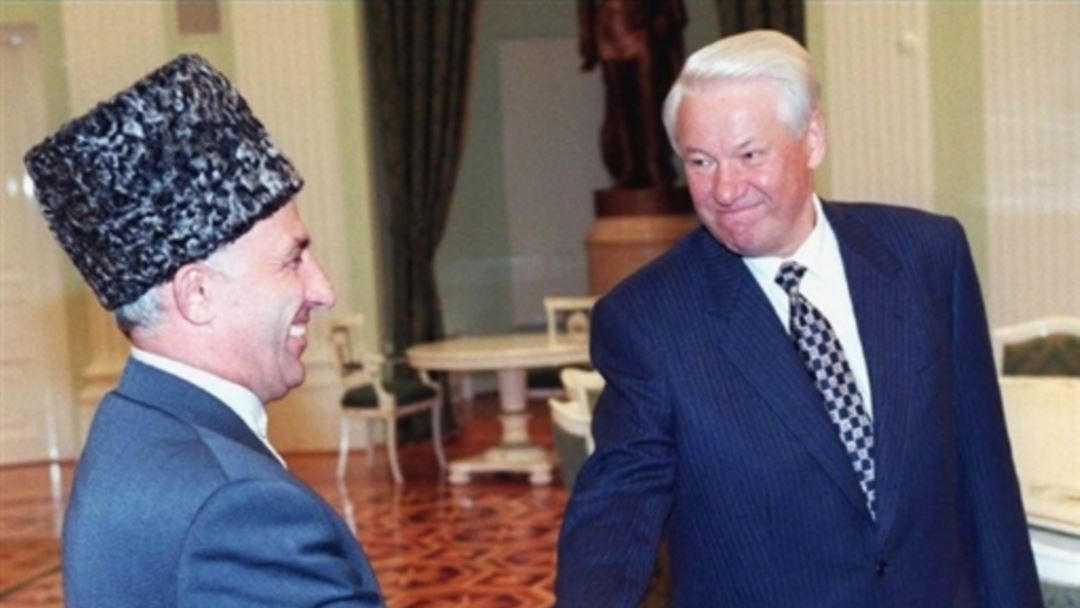 Chechen President Aslan Maskhadov with Russian Federation President Boris Yeltsin (Caucasian Knot)
Chechen President Aslan Maskhadov with Russian Federation President Boris Yeltsin (Caucasian Knot)
President Maskhadov has also signed on to the 1948 Convention on the Prevention and Punishment of the Crime of Genocide. Chechen participation in this accord has a more political purpose; the Chechens believe that acceptance of the convention implies de facto international recognition of Chechen sovereignty as an independent successor state of the Soviet Union. In support of that position the Chechen government claims that recognition was already granted in the 1997 Treaty on Peace and the Principles of Interrelations between the Russian Federation and the Chechen Republic of Ichkeria because treaties are normally negotiated between independent states under customary international law. [14] Accession to the 1948 convention also allows Chechnya to call upon signatory states to abide by their obligations to take action against states committing acts of genocide.
Conclusion
The latest war in Chechnya has entered a stage of bitterness and ruthlessness on the part of both protagonists that is unequal to anything experienced in 1994-96. The systematic atrocities engaged in by Russian security forces have revived the tradition of blood reprisals endorsed by the Chechen adat, with the claim of sanction from the shari’a. For their part, the Russian mix of police and special forces units live in constant fear of capture or death at the hands of the vengeful Chechens. Events have proved that the Russian soldier is unsafe anywhere in Chechnya, and the resultant psychological toil leads to acts of cruelty upon the civilian population that are unsanctioned by the customary or explicit rules of war. Maskhadov’s efforts to introduce international law in this conflict are unlikely to hold sway with most of his fellow Chechens, nearly all of whom have seen relatives raped, tortured or murdered. Nor is his appeal to the Convention on Genocide likely to have a greater effect than previous appeals to the international community, but it does establish the groundwork for continuing legal action against the Russian Federation.
Endnotes
- The Chechen government recently alleged that Russia used bacteriological weapons within Chechnya and performed chemical and bacteriological experiments on Chechen civilians in Russian concentration camps. “Crisis in Chechnya,” August 12, 2000, http://www.kolumbus.fi/kavkaz/english/12_8.htm (August 14, 2000).
- There have been several instances both in the current war and in the 1994-96 conflict of Russian prisoners converting to Islam and turning their skills and weapons against their former comrades. Under Islamic law, non-Muslim prisoners who convert to Islam may not be used in prisoner exchanges with the enemy.
- Ministry of Foreign Affairs, Chechen Republic of Ichkeria, Press Release 10-667, 3 July 2000.
- Chechen government officials accused Barayev of leading the kidnapping gang responsible for beheading four Western hostages in December 1998. Itar-Tass news agency, Moscow, December 26, 1998; “Chechens accuse warlord of leading kidnap ring,” Chechen Republic Online – News – 13 December 1998, http://www.amina.com/news/98/98.12.13.html
- See Lyoma Turpalov: “Battered Chechen fighters say fundamentalists betrayed them,” AP, 17 March 2000; and “Meeting of Chechen mujahidin commanders deny the Kremlin propagandists,: 1 August 2000; http://www.kolumbus.fi/Kavkaz/English/01_8.htm (4 August 2000).
- “Mujahideen issue severe warning to the Russian government,” 1 July 2000, http://www.Qoqaz.net (4 July 2000).
- “Russian Intelligence murder Russian civilians,” 11 July 2000, http://www.qoqaz.net (14 July 2000). On 21 August, the mujahidin claimed that the sinking of the nuclear submarine Kursk was the work of a Daghestani Muslim crewman who was in league with the Chechen rebels.
- “The Islamic ruling on the permissibility of executing prisoners of war,” http://63.249.218.164/html/chechnyaexecart.htm (n.d.), c. June 15, 2000.
- Allan Rosas, The Legal Status of Prisoners of War (Helsinki, Soumalainen tiedeakatemia, 1976), p. 448.
- “Exclusive interview with commander of Mujahideen forces in Chechnya, Shamil Basayev,” 1 July 2000, Azzam Publications, http://63.249.218.164/html/interviews.htm
- Khaled Abou El Fadl: “The rules of killing at war: an inquiry into classical resources,” Muslim World 89, April 1999, pp. 144, 153.
- Office of the President, Chechen Republic of Ichkeria, Decree no. 10-390, 7 July 2000; Instrument of succession to the Geneva Conventions of 1949 and their two additional protocols of 1977, accepted by the Swiss Federal Council on 31 May 2000 and approved by the International Committee of the Red Cross, 21 June 2000.
- Protocol additional to the Geneva Conventions of 12 August 1949, and relating to the protection of victims of international armed conflicts (Protocol 1), 8 June 1977, singed and ratified by the Russian Federation as a successor state to the USSR.
- See Francis A. Boyle: “Independent Chechnya: Treaty of Peace with Russia,” May 1997, Journal of Muslim Minority Affairs 18(1), 1998.

